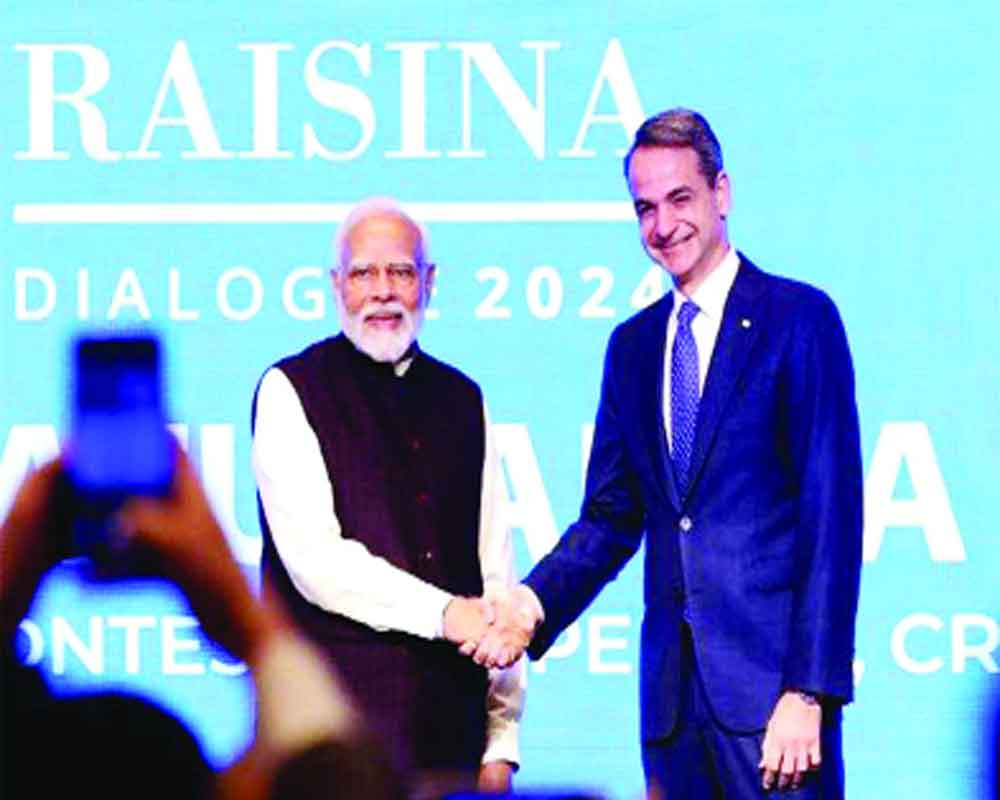With Turkey's consistent anti-India stance, India's calculated response includes bolstering ties with Greece, embroiled in a rivalry with Turkey
The Raisina Dialogue, a conference held annually in New Delhi, is India's flagship conference on geopolitics. One may wonder why Greece’s Prime Minister Kyriakos Mitsotakis was the chief guest and what importance Greece play in the larger scheme of things as far as India is concerned. One may recollect that Turkey has been taking an anti-India stance at most of the international forums. Since the abrogation of Article 370, Turkey has been raising the Kashmir issue, including at the United Nations General Assembly.
India has given well-calibrated responses to Turkey in a phased manner, one of them being, Prime Minister Narendra Modi holding meetings with the president of Cyprus and prime ministers of Armenia and Greece. All of these states have various disputes with Turkey. Greece and Turkey have been regional adversaries in the Aegean Sea, both asserting claims over their borders in the Sea. They were on the brink of war in 1996 over islets in the Aegean Sea. So honouring Greece's PM at a strategic dialogue in Delhi is a masterstroke that will have ripple effects in Ankara.
Is calling PM Kyriakos of Greece as Chief Guest of Raisina Hills dialogue a strategic response to Turkey? Has India now mastered the art of mixing global diplomacy with national interest? Will the present Raisina dialogue have an impact on global geopolitics? Is Greece our gateway to Europe through the Mediterranean Sea? In the years to come can Greece provide us with the trade routes we so require? Will the coming together of the world's oldest civilizations shape the future of the world in the years to come?
We should not forget that Greece and India have common security concerns in the Meditation Sea. India can help Greece in the field of cyber security and Greece can assist India with merchant vessels.
Greece can become an important partner in the India-Middle East-Europe Economic Corridor launched during India’s G20 presidency last year. The other common areas of growth can be in renewable energy, infrastructure, ports and shipping, and logistics.
The position of Greece is the world map is such that it has considerable dominance over the Mediterranean Sea. It is also a gateway to Europe. Greece is a member of NATO and has a rich cultural heritage. India on the other hand is looking to expand trade ties westwards. India also is considering better defence ties with countries that have similar ideologies. The scope of defence ties with Greece is hence immense.
Over the past few years, Greece has given importance to defence cooperation and military exercises between the two countries. Greece has always backed India’s position on the Kashmir issue. India and Greece have common concerns with maritime security and implementation of the UN Convention on the Law of the Sea. This law is being violated by Turkey and China in the Eastern Mediterranean and the Indo-Pacific almost every day.
It will be in the scheme of things if in the future India and Greece build upon the already existing defence ties. India can always look forward to exporting defence equipment particularly anti-drone systems to Greece keeping in view that Turkey has built an extensive Drone system that can be used to dominate various islands that are otherwise part of Greece. India can also seek help in shipbuilding technology from Greece, as Greece has an age-old tradition of making boats and ships. A collaboration between Mazgaon Dockyard and Skaramanga Shipyard can give Indian shipbuilding a major flip. Skaramanga has expertise in ship repair and maintenance.
Greece is one country that has tremendous tourism potential as it is known to be the birthplace of Western civilization. Greece has stunning archaeological treasures, beautiful seaside villages and sun-soaked beaches making it one of the most interesting places to visit for Indians. Cruise holidays between Mumbai and Greece then hold a lot of promise.
India and Greece must build a Strategic Partnership by upgrading their bilateral ties further and forging cooperation in dimensions of economic, defence, maritime, shipping and cultural fields as they have a common interest in international and regional developments. India and Greece also have shared values of democracy, freedom, international peace and security, rules-based international order, respect for international law including UNCLOS, and human rights.
Both countries have a shared historical linkage and long-standing ties which is at the core of their growing strategic relationship. Greece’s interest in joining the Indo-Pacific Oceans initiative to conserve and sustain the maritime domain is a bold step. Both countries are equally affected by climate change and biodiversity loss and can work together in this direction too. It looks like in the future India and Greece can shape Global Geopolitics in a way that suits each other's countries' interests. Close ties between the two countries could be beneficial for both. Greece can balance the negative sentiment that Turkey is trying to generate against India at various international forums.
Greece can also facilitate India's ambition to trade with the EU via its maritime fleet and favourable trade routes that provide India exclusive access to European Markets.
(The writer is an expert on geopolitics and international Affairs. The views expressed are personal)
























